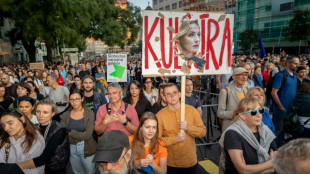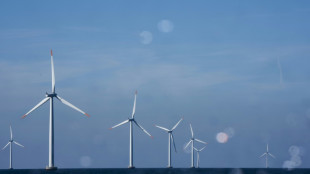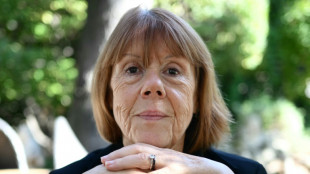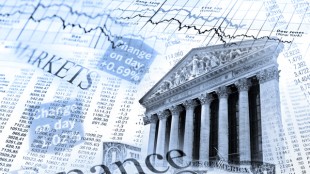
-
 Time Magazine names Donald Trump person of the year for second time
Time Magazine names Donald Trump person of the year for second time
-
Macron expected to name new French PM

-
 Salome Zurabishvili: defiant champion of Georgia's EU dream
Salome Zurabishvili: defiant champion of Georgia's EU dream
-
Syria govt pledges 'rule of law' after Assad's overthrow

-
 'No longer of this time': Miss Netherlands pageant scrapped
'No longer of this time': Miss Netherlands pageant scrapped
-
Gaza rescuers say Israeli strikes kill 33

-
 Swiss central bank announces big rate cut to boost economy
Swiss central bank announces big rate cut to boost economy
-
European stocks rise after surprise Swiss rate cut

-
 Cycling chiefs move to ban controversial carbon monoxide use
Cycling chiefs move to ban controversial carbon monoxide use
-
Fourth suspect held in deadly Dutch building collapse

-
 Suspense mounts as Macron expected to name new French PM
Suspense mounts as Macron expected to name new French PM
-
Russians suffer rising costs of Ukraine conflict

-
 K-pop, carols, free food at South Korea impeachment protests
K-pop, carols, free food at South Korea impeachment protests
-
Syrian whose selfie with Merkel went viral wants to stay in Germany

-
 Sweden ends rape investigation allegedly targeting Kylian Mbappe
Sweden ends rape investigation allegedly targeting Kylian Mbappe
-
Israel condemned by media groups over Gaza journalist 'massacre'

-
 Sweden ends rape inquiry allegedly targeting Kylian Mbappe
Sweden ends rape inquiry allegedly targeting Kylian Mbappe
-
Gaza rescuers say Israel kills 33 in morning strikes

-
 Suspense mounts as Macron prepares to unveil new French PM
Suspense mounts as Macron prepares to unveil new French PM
-
'Taste of love': Donkey milk cheese meets success in Albania

-
 Fears for the future as drug deaths among young Finns soar
Fears for the future as drug deaths among young Finns soar
-
Asian markets rise after Wall St record; eyes on China

-
 Nationalist minister tests Slovak culture, LGBT limits
Nationalist minister tests Slovak culture, LGBT limits
-
Blown off course, turbine giant Orsted seeks second wind

-
 Gisele Pelicot: France rape survivor who became a feminist hero
Gisele Pelicot: France rape survivor who became a feminist hero
-
Kevin Johnson: US boxer fighting for Putin's Russia

-
 How an ex-inmate of brutal Syria jail overcame trauma by helping others
How an ex-inmate of brutal Syria jail overcame trauma by helping others
-
Hawks beat Knicks, Rockets down Warriors to reach NBA Cup semis

-
 'Alarming' US mystery drones confound officials, scare locals
'Alarming' US mystery drones confound officials, scare locals
-
Korean Air buys majority stake in rival Asiana Airlines

-
 Australia to force tech titans to pay for news
Australia to force tech titans to pay for news
-
Australia to force tech titans to pay for news shared on platforms

-
 Taiwan detects 16 Chinese warships around island
Taiwan detects 16 Chinese warships around island
-
Trump taps election denier to head global media operation VOA

-
 Tokyo to make day care free to boost birth rate
Tokyo to make day care free to boost birth rate
-
Taiwan says detects 16 Chinese warships around island

-
 Asian markets fluctuate after Wall St record; eyes on China
Asian markets fluctuate after Wall St record; eyes on China
-
Vulnerable Afghans struggle as Taliban rebuild Kabul roads

-
 Amid weak eurozone and political turmoil, ECB to cut rates again
Amid weak eurozone and political turmoil, ECB to cut rates again
-
South Korea's Yoon vows to fight 'until the very last minute'

-
 Australia to spend $385 mn on PNG rugby league team with eye on China
Australia to spend $385 mn on PNG rugby league team with eye on China
-
Health insurers: the 800-pound gorilla in profit-driven US system

-
 Pope to champion popular Catholic traditions in Corsica
Pope to champion popular Catholic traditions in Corsica
-
Lithium-rich Bolivia lags behind in race to mine key metal

-
 Video game bosses gather at 'darkest hour' for industry
Video game bosses gather at 'darkest hour' for industry
-
Belichick inks deal to coach US college team

-
 Belichick inks deal to coach US college team: report
Belichick inks deal to coach US college team: report
-
Krakatoa Jardim Becomes the First Official Distributor of SYNLawn in Portugal

-
 UN General Assembly calls for 'unconditional' Gaza ceasefire
UN General Assembly calls for 'unconditional' Gaza ceasefire
-
Dortmund fear 'worst-case scenario' after Schlotterbeck injury


Russians suffer rising costs of Ukraine conflict
In the small town of Dedovsk, just outside Moscow, pensioner Zinaida Kudriavtseva is struggling to pay the bills.
Russia has been gripped by a cycle of rising prices since it launched its military offensive on Ukraine almost three years ago.
Driven by an explosion in state spending on the conflict, inflation has surged, hitting hardest those who were already living close to the breadline.
"Everything is expensive," Kudriavtseva told AFP on a recent visit to the town, 30 kilometres (20 miles) outside the centre of the Russian capital.
She can no longer afford expensive medicine, meat or new clothes, and it's not easy to pay the rent on her pension of around 16,000 rubles ($150) a month.
"Fortunately, my daughters give me their clothes. Look at these shoes, they're a young person's shoes," she said, embarrassed.
Inflation is expected to hit nine percent by the end of the year, following increases of 7.4 percent in 2023 and 11.9 percent in 2022.
That economic turbulence came fresh off the back of the Covid pandemic, which hit Russia hard, and following years of falling living standards after the West imposed sanctions over Moscow's 2014 annexation of Crimea.
- 'No to war' -
To combat inflation, the central bank has raised its benchmark interest rate to 21 percent, a level not seen since 2003.
For consumers and businesses, the cost of borrowing on the market has become prohibitively high.
Yet powered by the Kremlin's massive outlays on arms and soldiers -- which are set to ramp up by another third next year -- and aggravated by Western sanctions, prices in shops are still rising.
Central bank governor Elvira Nabiullina has signalled she is considering raising rates yet again at a meeting next week, just ahead of the New Year holidays.
For Kudriavtseva, thinking about the future is too difficult.
"I live day to day," she said, also expressing fears over the conflict with Ukraine.
"Drones are flying here too," she said, referring to sporadic Ukrainian attacks targeting the Russian capital, a response to Russia's daily bombardment of Ukrainian cities.
"There's no guarantee that we won't face starvation," she said.
Her greatest wish? "That there will be no more war."
A similar message is painted on some walls around the city.
"No to War!" reads the graffiti.
Russians using such a phrase are liable to be prosecuted under strict military censorship laws, ushered in amid what the Kremlin portrays as an existential fight for survival against the West.
- 'I want peace' -
Returning from the supermarket, Viktor Markov ran through his purchases: bread, potatoes, chicken.
"Prices are going up every day. Apples cost 150 roubles ($1.40) and more. Coffee is 400 rubles," he said.
"I don't buy them at that price. I'm waiting for a discount."
Many people blame the conflict in Ukraine and the government's military expenditure for the price rises.
Defence spending is set to hit almost 13.5 trillion rubles ($125 billion) next year, more than six percent of Russia's GDP and representing around 40 percent of all state spending.
That follows a near 70 percent annual increase in military spending in 2024.
"What can we expect? The war goes on. And war requires resources," Markov said.
With a monthly pension of 22,000 rubles, he and his wife, Nina, 73, will not be able to afford traditional red caviar on the New Year table.
Prices for the salmon roe have doubled over the last year to 13,000 rubles a kilogramme.
Others on the streets of Dedovsk were worried about even more basic necessities.
Viktoria, a 30-year-old interpreter and foreign language teacher who lives in a wooden cottage, was angry at rising prices for nappies and baby food.
"I want peace to return," she said.
"Everything that's happening in the country is increasing people's anxiety."
J.Bergmann--BTB
